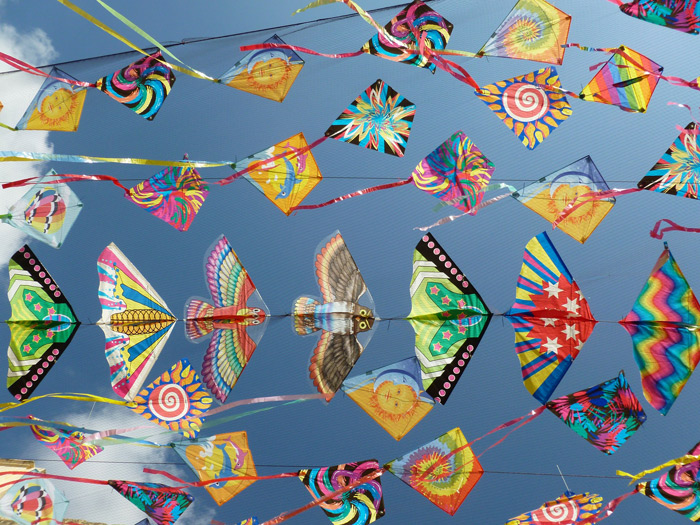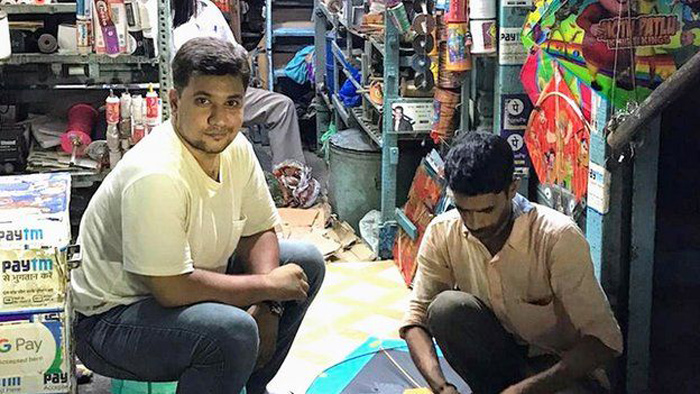疫情期间意大利人在阳台上放声歌唱,而印度人则热衷于放风筝。据报道,往年的风筝淡季在今年反而成了旺季,放风筝成为了隔离在家的印度人为数不多的消遣活动。

Photo by Aaron Burden on Unsplash
Mohammad Ahmed has been selling kites for the past 11 years, and he says he has never seen it so busy.
穆罕默德·艾哈迈德已经卖了11年风筝,他表示从未见过生意如此繁忙。
Sales at his shop in Delhi have soared over the past six months - thanks to coronavirus.
过去六个月他在德里的风筝店销量大涨,这都是拜疫情所赐。
Mr Ahmed says that most days since India went into lockdown on 25 March he has restocked his shop with kites worth a total 150,000 rupees, only for them to sell out by the evening.
艾哈迈德说,自从印度在3月25日实行封锁以后,他每天都要补充总价15万卢比(约合人民币13987元)的风筝库存,但大多数时候总是不到天黑就卖光了。
"I am tired of taking phone calls," he says. "Suddenly everybody has needed kites. I am still getting calls from all over the country - Maharashtra, Tamil Nadu, Rajasthan… There is still so much demand that I am not able to fulfil it."
他说:“我接电话都接烦了。突然之间每个人都需要风筝。我还在不停地接到来自全国各地的电话,马哈拉施特拉邦、泰米尔纳德邦、拉贾斯坦邦……需求量依然这么大,我都没法满足了。”

Mohammad Ahmed (left) has also been exporting kites from India to Pakistan. Credit: Mohammad Ahmed
While Italians sang songs from their balconies and windows to boost morale when they were stuck at home due to Covid-19 restrictions, Indians flew kites from their terraces and roof tops.
由于疫情限制措施而不得不待在家里的意大利人在阳台上和窗前唱歌来鼓舞士气,而印度人则在自家露台和屋顶上放风筝。
Ahsan Khan, a seller in Mumbai, says, "The period between April and August is usually the leanest [for kite sales], but this year, I have sold about 500,000 kites [during that time]."
孟买的一名卖家阿赫桑·汗表示:“四月到八月期间通常是风筝销售的淡季,但今年我却(在这一期间)卖出了约50万只风筝。”
He adds that neighbouring Pakistan had also caught the kite-flying bug during its lockdown. "I am even getting calls from Karachi and Lahore in Pakistan, from people offering to pay me double the usual amount."
他还说道,邻国巴基斯坦也在封锁期间掀起了放风筝的热潮。“我甚至接到了来自巴基斯坦卡拉奇和拉合尔的电话,那里的人们提出用双倍价钱买我的风筝。”
Kite-flying has been a popular pastime in India for centuries, with historians saying that it was introduced to the country by Chinese travellers.
几个世纪以来,放风筝在印度一直是广受欢迎的消遣活动,历史学家称放风筝是由中国旅人引进的。
It is however, usually a seasonal activity in India. In most parts of the country sales peak around the festival of Makar Sankranti - celebrated on 14 January to mark the beginning of spring and harvest season.
不过,在印度,放风筝通常是一种季节性活动。在印度的多数地区,风筝销量会在马卡尔·桑克兰蒂节前后达到高峰。1月14日庆祝的马卡尔·桑克兰蒂节是为了纪念春天和收获季节的开始。
The tradition of kite-flying has long been associated with this festival, with the western state of Gujarat organising an international kite festival on the same day.
长期以来,放风筝的传统一直和这个节日相关联,印度西部的古吉拉特邦会在同一天举行国际风筝节。
Preparations for this begin months earlier, with kite-makers from other parts of the country going to Gujarat, and the city of Mumbai, just to the south, to lend their expertise in making India's traditional brightly-coloured paper kites.
国际风筝节的筹备工作在数月前就会开始,来自印度其他地区的风筝制作者会聚集到古吉拉特邦和古吉拉特邦以南的孟买市,贡献自己的才艺来制作印度传统的色彩鲜艳的纸风筝。
Some other festivals, like Basant Panchami and Pahela Baishakh, keep up the demand in northern India till April, after which sales start to fall. They then recover just before 15 August when India celebrates its Independence Day.
其他的一些节日,比如知识节和孟历新年,会让印度北部对风筝的需求高峰持续到四月份,之后销量就开始下降。风筝销量在8月15日印度庆祝独立日前又会重新开始上涨。

Photo by Agnieszka Ziomek on Unsplash
But this year, the coronavirus lockdown has kept the kite industry very busy during its usual lean months. Even after the lockdown began being eased in stages from June to the end of August, children, mostly boys, kept the demand high as the schools remained shut.
但在今年,疫情封锁却让风筝行业在往年的淡季异常繁忙。即使在六月到八月底的这段时间,封锁措施开始放松,但由于学校依然关闭,孩子们(以男孩为主)依然让风筝需求量居高不下。
"You couldn't go out, you couldn't take your children to the park, so people resorted to kite-flying to pass their time," says Shahida Rehman, who manages a kite business with her son in Mumbai.
在孟买和儿子一起经营风筝生意的沙希达·拉赫曼说:“你不能出去,也不能带孩子去公园,所以人们只能放风筝来消磨时间。”
Although in one or two India cities and towns kite flying ended up being banned during the lockdown because authorities were concerned that neighbours all going out on their terraces could transmit the virus to each other, overall it was allowed and sales boomed.
尽管在封锁期间有一两个印度城镇禁止放风筝,原因是当局担心邻居们都跑到露台上会相互传播病毒,但总体上还是允许放风筝的,风筝销量也非常好。
The Indian kite-making sector was said to be worth $85m in 2018. While it exports around the world, sales are dominated by the vast home market.
印度的风筝制造业据称在2018年价值达8500万美元(约合人民币5.8亿元)。尽管出口到世界各地,但本土市场的销量还是占多数。
But while it is boys and young men who do most of the flying, the industry is heavily dependent on women workers. Tens of thousands of them, often accompanied by their children and other family members, work from their homes around the country, cutting, crafting and designing kites.
虽然放风筝的大多是男孩和年轻男子,但该行业严重依赖于女性劳工。印度各地数以万计的女性在自己家中(往往带着孩子和其他家庭成员)剪裁、制作和设计风筝。
Hiba is one such manufacturer. She can make up to 50 kites per day with her sister at their home in the city of Bareilly, some 250km east of Delhi. The big rise in demand during the lockdown has boosted their income, as both the sales and prices of kites rose.
伊巴就是这样的一个制作者。她每天在巴雷利市(德里以东大约250公里处)的家中和妹妹一起可以制作出多达50只风筝。封锁期间需求量大涨增加了她们收入,因为风筝的销量和价格都上升了。
The cost of a simple paper and wood kite doubled from 10 rupees to 20 rupees.
用纸和木头制成的简单风筝的成本为10卢比到20卢比。
Mohammad Ashraf, a kite-seller in Bareilly, says that despite not being able to open his store in the early, most strict stages of the lockdown, he sold more than 200,000 rupees worth of kite before August.
巴雷利的一名风筝卖家穆罕默德·阿什拉夫表示,尽管在早期封锁措施最严格的时候他不能开店,但他在八月前卖出了价值超20万卢比的风筝。
"This year changed everything," he says. "It has been a extra income bonanza."
“今年一切都改变了,”他说,“这是一笔意外之财。”
bonanza[bəˈnænzə]: n. 带来好运之事;幸运
Mr Khan says that sales have been led by India's smaller cities and towns, as that is where more people have individual terraces or roof tops. This is in contrast to the big cities, like Mumbai, where most people live in flats and have to share such outdoor areas. These communal spaces were officially out of bounds during the lockdown.
阿赫桑·汗表示,印度的小城镇销量最高,因为那里更多人拥有独立的露台或屋顶。相比之下,在孟买这样的大城市,多数人都住在公寓里,必须共享户外空间。这些公共空间在封锁期间都是官方禁止开放的。
Like all countries, India may now be at risk of returning to lockdown. This is especially true after the nation reported almost two million new cases in August, the biggest monthly number globally since the pandemic started.
和所有国家一样,印度现在可能面临着重新封锁的风险,尤其是在印度八月报告了近200万新增病例后,这是疫情暴发以来全球最高的单月新增病例数量。
While the health and safety of the populace is obviously the main concern, kite flying is likely to remain a popular distraction for a great many people if they are forced to stay at home again.
尽管大众的健康和安全显然是关注焦点,但是如果人们再次被迫待在家里,放风筝很可能会继续成为一项流行的消遣活动。
英文来源:BBC







